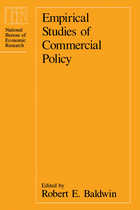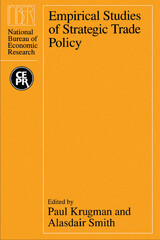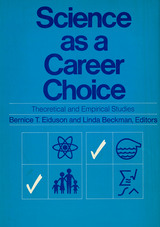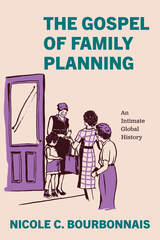3 books about Empirical Studies

Empirical Studies of Commercial Policy
Edited by Robert E. Baldwin
University of Chicago Press, 1991
The need for careful research on trade policy is particularly acute, and this volume empirically addresses these and many other important issues. The contributors offer studies which integrate the institutional details of current trade policy with creative economic analyses.
Marked by a shift from a traditional reliance on simulation models, these papers take their inspiration from recent changes in the assumptions traditionally underlying research in international trade theory. No longer are government policies viewed as being somehow "given" to the researcher; in part 1, "Analyses with a Political Economy Perspective," four papers treat such policies as endogenous and explicable in terms of political economy. Neither are product and factor markets seen as perfectly competitive; instead, the three papers in part 2, "Trade Policy Effects under Imperfectly Competitive Market Conditions," assume that firms consider the actions of other companies when formulating their decisions. In part 3, "A New Measure of Trade Restrictiveness and Estimates of Trade Policy Effects with CGE Models," the first essay explores the quantitative restrictions on cheese to develop and implement a new model of restrictive trade. Two final contributions address problems for which simulation modeling is especially useful. The first considers the effectiveness of an import surcharge in reducing the U.S. trade deficit and the second treats the welfare effects of liberalization in South Korea where increasing returns to scale are significant
These innovative studies focus on economic behavior that will provide valuable insights for policymakers, academic economists, and students.
Marked by a shift from a traditional reliance on simulation models, these papers take their inspiration from recent changes in the assumptions traditionally underlying research in international trade theory. No longer are government policies viewed as being somehow "given" to the researcher; in part 1, "Analyses with a Political Economy Perspective," four papers treat such policies as endogenous and explicable in terms of political economy. Neither are product and factor markets seen as perfectly competitive; instead, the three papers in part 2, "Trade Policy Effects under Imperfectly Competitive Market Conditions," assume that firms consider the actions of other companies when formulating their decisions. In part 3, "A New Measure of Trade Restrictiveness and Estimates of Trade Policy Effects with CGE Models," the first essay explores the quantitative restrictions on cheese to develop and implement a new model of restrictive trade. Two final contributions address problems for which simulation modeling is especially useful. The first considers the effectiveness of an import surcharge in reducing the U.S. trade deficit and the second treats the welfare effects of liberalization in South Korea where increasing returns to scale are significant
These innovative studies focus on economic behavior that will provide valuable insights for policymakers, academic economists, and students.
[more]

Empirical Studies of Strategic Trade Policy
Edited by Paul Krugman and Alasdair Smith
University of Chicago Press, 1994
Since the 1980s, economists have used the concept of strategic trade policy, which takes account of imperfect competition and increasing returns in the international marketplace, to criticize conventional views about free trade. According to the new view, a government can take strategic steps to raise its income at another country's expense—by subsidizing exports or erecting trade barriers, protecting certain firms from foreign competition, or promoting the development of new industries. This volume looks at the experience of specific industries in order to determine the effectiveness of strategic trade policy in promoting economic growth.
The nine papers cover the U.S. and European auto industries, the U.S. steel industry, the commercial aircraft industry, airline deregulation in Scandinavia, and labor and industrial policy in Korea and Taiwan. The authors refine the basic techniques for measuring policy effectiveness, extend them to encompass industry dynamics, and test the implications of new trade models.
International economists and trade experts in government and business will find important new insights into the role of strategic trade policy in international competitiveness.
The nine papers cover the U.S. and European auto industries, the U.S. steel industry, the commercial aircraft industry, airline deregulation in Scandinavia, and labor and industrial policy in Korea and Taiwan. The authors refine the basic techniques for measuring policy effectiveness, extend them to encompass industry dynamics, and test the implications of new trade models.
International economists and trade experts in government and business will find important new insights into the role of strategic trade policy in international competitiveness.
[more]

Science as a Carreer Choice
Theoretical and Empirical Studies
Bernice T. Ediuson
Russell Sage Foundation, 1974
How can we identify the young men and women who, as social and behavioral scientists of tomorrow, will do the needed research to resolve our burgeoning social problems? How can the most promising be attracted to an investigatory career? How can they become identified with the behaviors, attitudes and values that persons in science share? A provocative body of literature about the psychology of the scientist and his career emerged in the post-Sputnik era. Drs. Eiduson and Beckman bring together more than seventy of the most significant and representative studies. These range over childhood and family influences, academic experiences, motivations, interests, and intellectual and personality strengths that have been examined as precursors for choosing science as adult work. The psychological mechanisms involved in socializing a young person toward a scientific career are suggested in readings from the outstanding theoreticians in the field. Selections on scientific career lines, decisions and options at various stages of work, and factors influencing goals and career development contribute to the understanding of the psychological life of the highly endowed and well-functioning professional adult. Through showing the certain completeness of effort of what has been learned about the psychology of scientists to date, the authors anticipate a resurgence of interest in the creative individual, a renewed enthusiasm for application, and a refocusing of research on the issues unique to the social and behavioral research scientist.
[more]
READERS
Browse our collection.
PUBLISHERS
See BiblioVault's publisher services.
STUDENT SERVICES
Files for college accessibility offices.
UChicago Accessibility Resources
home | accessibility | search | about | contact us
BiblioVault ® 2001 - 2025
The University of Chicago Press









